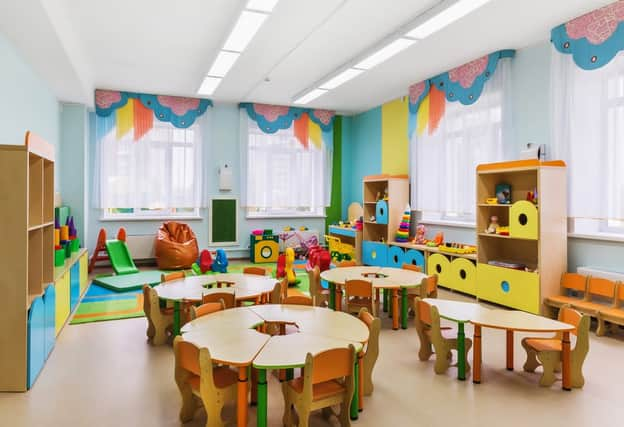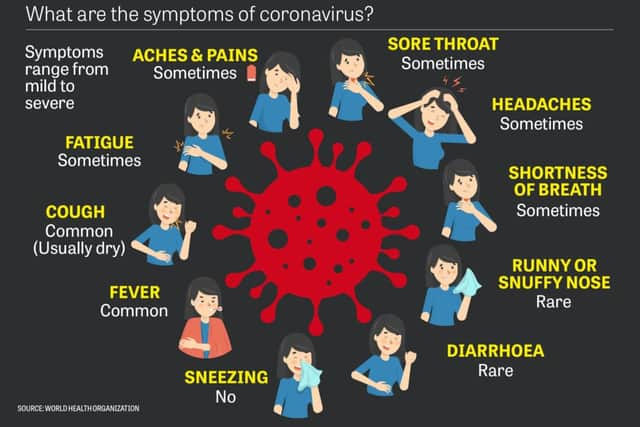Have nurseries closed due to the coronavirus outbreak?


The Covid-19 strain of the coronavirus has continued to spread throughout the world, with many countries, including the UK, introducing social distancing measures to try and battle the virus, which includes closing down schools.
With millions of children off school and younger ones enrolled in childminders and nurseries, how will parents manage childcare throughout the coronavirus pandemic?
Here’s what you should know.
Advertisement
Hide AdAdvertisement
Hide Ad

Are nurseries closed?
It’s been announced that schools in the UK are to shut their doors from Friday 20 March until further notice, as a result of the ongoing coronavirus pandemic.
Prime Minister Boris Johnson said that schools will close except for looking after children of key workers, like NHS staff, and vulnerable children.
Following this announcement, nurseries, private schools and sixth forms were told that they should also follow the guidance given by the government to shut down. The announcement from the government said that “financial support for these settings” would be provided as required.
Deputy First Minister and Education Secretary John Swinney explained in a statement on 19 March that the children who would be allowed back into schools and nurseries would “have continuing access to all-age learning and childcare”.
Advertisement
Hide AdWill free childcare be provided?
On 17 March, the government issued an announcement stating that free childcare would be offered during coronavirus school closures.
Advertisement
Hide AdThe statement said: “Funding for the government’s early years entitlements will continue during any periods of nursery, preschool or childminder closures, or where children cannot attend due to coronavirus (COVID-19).”
In the event of advised closures, The Department for Education set out its expectations that local authorities should continue to pass on the government funding it receives for these entitlements to providers.
The government also confirmed that there will not be a rise in the fees paid by early years and childcare providers to register with Ofsted in 2020-21.
Advertisement
Hide AdEducation Secretary Gavin Williamson said: “We will continue to pay for all free early years entitlements in places, even in the event that settings are closed on the advice of Public Health England, or children are not able to attend due to coronavirus, and we will not be asking for funding back from local authorities.”
The Department of Education also stated that Ofsted is to temporarily suspend any routine inspections for schools, colleges, early years settings, children’s social care providers and local authorities, in order to reduce the “burden on the staff who are providing vital services to the nation in response to coronavirus”.
Advertisement
Hide AdIs it safe for children to have play dates?
As the UK government implements stricter social distancing measures, some parents with bored children might be wondering if it’s okay to have their children get together as they normally would.
Dr Keri Althoff, a professor of epidemiology at the Johns Hopkins Bloomberg School of Public Health in Baltimore, Maryland, said to the BBC that social distancing requires everyone to stay apart - this includes children.
Advertisement
Hide AdEven though children only seem to display mild or even no symptoms of the virus, they’re still able to pass it on to others.
So while you might think that your child is totally healthy, they may have the virus without symptoms and could pass it on to someone less equipped to deal with it.
(Photo: WHO)
Coronavirus: the facts
What is coronavirus?
COVID-19 is a respiratory illness that can affect lungs and airways. It is caused by a virus called coronavirus.
Advertisement
Hide AdWhat caused coronavirus?
The outbreak started in Wuhan in China in December 2019 and it is thought that the virus, like others of its kind, has come from animals.
Advertisement
Hide AdHow is it spread?
As this is such a new illness, experts still aren’t sure how it is spread. But.similar viruses are spread in cough droplets. Therefore covering your nose and mouth when sneezing and coughing, and disposing of used tissues straight away is advised. Viruses like coronavirus cannot live outside the body for very long.
What are the symptoms?
The NHS states that the symptoms are: a dry cough, high temperature and shortness of breath - but these symptoms do not necessarily mean you have the illness. Look out for flu-like symptoms, such as aches and pains, nasal congestion, runny nose and a sore throat. It’s important to remember that some people may become infected but won’t develop any symptoms or feel unwell.
What precautions can be taken?
Washing your hands with soap and water thoroughly. The NHS also advises to cover your mouth and nose with a tissue or your sleeve (not your hands) when you cough or sneeze; put used tissues in the bin immediately and try to avoid close contact with people who are unwell. Also avoiding touching eyes, nose and mouth unless your hands are clean.
Government advice
As of Monday 16 March the government advised that everyone should be observing social distancing - avoiding unnecessary travel and working from home where possible. Anyone with a cough or cold symptoms now needs to self-isolate with their entire household for 14 days. The government has also advised against going to the pub, out for dinner or partaking in any socialising with large groups. This has caused a number of closures across the country. Schools will close from Friday 20 March for the foreseeable future and exams have been cancelled.The over 70s or anyone who is vulnerable or living with an underlying illness are being asked to be extra careful and stay at home to self-isolate.For more information on government advice, please check their website here.
Advertisement
Hide AdAdvertisement
Hide AdShould I avoid public places?
The advice now is to avoid public places and any non-essential travel. Travel abroad is also being advised against for the next 30 days at least, and many European countries have closed their borders.
What should I do if I feel unwell?
Don’t go to your GP but instead call NHS 111 or look online at the coronavirus service that can tell you if you need medical help and what to do next.
When to call NHS 111
NHS 111 should be used if you feel unwell with coronavirus symptoms, have been in a country with a high risk of coronavirus in the last 14 days or if you have been in close contact with someone with the virus.